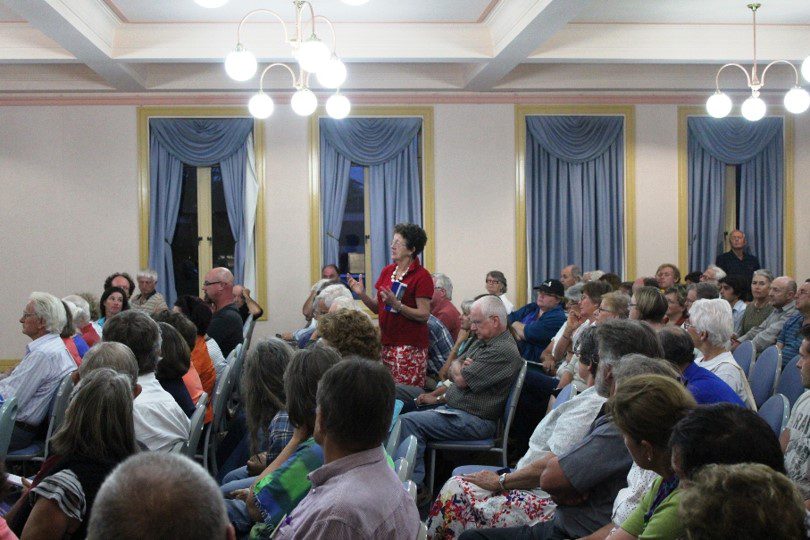Community Engagement
E-Quarterly Newsletter - March 2025
By Dan Tienter, Municipal Advisor
Blueprint for a Better Budget
At Ehlers, we often emphasize that budget development and adoption may be the most critical activity for any local government. Yet, despite the significance of this annual practice, the public sometimes knows little about its impact on their daily lives – both in the costs they bear and the services they receive. Perhaps more concerning, they may feel disconnected from the budget process and unaware of their ability to shape public policy. Today, perhaps more than ever, local governments need to better connect with their communities and try to understand their opinions on various topics.
Through earnest community engagement, local governments can help stakeholders gain a greater understanding of the challenges and constraints at play in their community while inspiring creative and effective solutions for public issues. Along the way, meaningful public involvement builds trust, enhances transparency, and improves the decision-making process. To support these efforts, local governments may take a bit of inspiration from architecture as they build and expand community engagement strategies.
Throughout his career, renowned architect Frank Gehry observed that architecture, like local government, tends to be idealistic and strives to create a better community through generational works. He also noted that democratic processes foster a collision of ideas as individuals advocate for their needs and preferences. Ultimately, these motivations combined with open debate allow local governments (he referred to cities, specifically) to build most anything.
Like an architect, local governments tend to focus their community engagement on capital projects, such as building renovations, park enhancements and street improvements, rather than budget discussions or financial decisions and impacts. However, the development of the annual budget, and various trade-offs during that process, lends itself well to community engagement. Depending on the community and topics in question, there are several strategies and tools to encourage and facilitate public involvement in arguably the most important activity of the year – development of the annual budget.
To assist local governments in evaluating their community engagement options and the associated benefits and challenges, Ehlers developed a pragmatic blueprint for community engagement. Generally, and for maximum effectiveness, local governments use a combination of these strategies, either as part of ongoing efforts or when seeking input on a specific issue.
Community Engagement Blueprint

The Impact of Public Engagement
Empirical research highlights the benefits of public engagement in governmental and financial decision-making. In fact, several studies underscore its effectiveness, including the following examples:
- A study by the Organization for Economic Cooperation and Development found that public participation in policy development led to a 20% increase of trust in government institutions.
- A study conducted by Sacramento State University found that well-informed and engaged residents were 17% less likely to perceive taxes as “too high.”
- A Pew Research Center study revealed that individuals were 25% more likely to comply with local regulations when they “felt heard” by local officials.
In other words, additional community engagement meaningfully increases trust in local government, changes opinions about the cost of government services and enhances compliance with local regulations. Simply put, community engagement leads to better budget outcomes.
Building a Better Budget Together
Each fiscal year, local governments must carefully balance competing priorities, finite resources, regulatory constraints and shifting political landscapes while remaining responsive to public needs. By prioritizing meaningful community engagement, local officials can improve budget outcomes, generate public trust in their decision-making, and enhance the credibility of their organization. Much like great architecture, community engagement in the budget process – when done well – can build nearly anything, resulting in something lasting, impactful, and truly reflective of the community it serves.
Required Disclosures: Please Read
Ehlers is the joint marketing name of the following affiliated businesses (collectively, the “Affiliates”): Ehlers & Associates, Inc. (“EA”), a municipal advisor registered with the Municipal Securities Rulemaking Board (“MSRB”) and the Securities and Exchange Commission (“SEC”); Ehlers Investment Partners, LLC (“EIP”), an investment adviser registered with the SEC; and Bond Trust Services Corporation (“BTS”), holder of a limited banking charter issued by the State of Minnesota.
This communication does not constitute an offer or solicitation for the purchase or sale of any investment (including without limitation, any municipal financial product, municipal security, or other security) or agreement with respect to any investment strategy or program. This communication is offered without charge to clients, friends, and prospective clients of the Affiliates as a source of general information about the services Ehlers provides. This communication is neither advice nor a recommendation by any Affiliate to any person with respect to any municipal financial product, municipal security, or other security, as such terms are defined pursuant to Section 15B of the Exchange Act of 1934 and rules of the MSRB. This communication does not constitute investment advice by any Affiliate that purports to meet the objectives or needs of any person pursuant to the Investment Advisers Act of 1940 or applicable state law. In providing this information, The Affiliates are not acting as an advisor to you and do not owe you a fiduciary duty pursuant to Section 15B of the Securities Exchange Act of 1934. You should discuss the information contained herein with any and all internal or external advisors and experts you deem appropriate before acting on the information.
